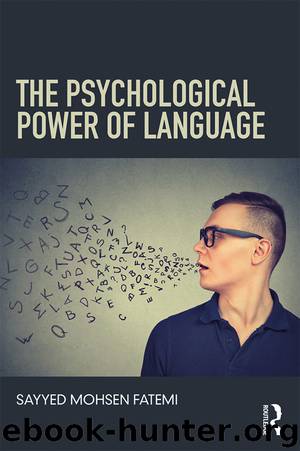The Psychological Power of Language by Sayyed Mohsen Fatemi

Author:Sayyed Mohsen Fatemi
Language: eng
Format: epub
Publisher: Taylor & Francis (CAM)
Published: 2018-06-27T16:00:00+00:00
Bibliography
Ambrulevich, A. K. (1986). An analysis of the levels of thinking required by questions in selected literature anthologies for grade eight, nine, and ten (Doctoral dissertation, University of Bridgeport). Dissertation Abstracts International, 47~ 769A.
Applebee, A. (1978). The child’s concept of story. Chicago: University of Chicago Press.
Bakhtin, M. M. (1986). Speech genres and other late essays. Austin: University of Texas.
Bakhtin, M. M. (1979/1986). Speech genres and other late essays (V. W. McGee, Trans.). Austin, TX: University of Texas Press.
Beach, R. (1993). A teacher’s introduction to reader-response theories. Urbana, IL: NCTE Teacher’s Introduction Series.
Bell, R. (1988). Four readers reading. In M. Benton, J. Teasey, R. Bell, & K. Hurst (Eds.), Young readers responding to poems (pp. 88–1560). New York: Routledge.
Bleich, D. (1975). Readings and feelings: An introduction to subjective criticism. Urbana, IL: National Council of Teachers of English.
Bunbury, R. (1985). Levels of response to literature. Australian Journal of Reading, 8, 220–228.
Culler, J. (1980). Literary competence. In J. Tompkins (Ed.), Reader- response criticism (pp. 101–117). Baltimore: Johns Hopkins University Press.
Cullinan, R., Harwood, K., & Galda, L. (1983). The reader and the story: Comprehension and response. Journal of Research and Development in Education, 16, 29–38.
Derrida, J. (1976). Of Grammatology (G. C. Spivak, Trans.). Baltimore: Johns Hopkins University Press.
Dias, P. (1987). Making sense of poetry: Patterns in the process. Ottawa: Canadian Council of Teachers of English. [Earlier edition of Reading and responding to poetry, 1996).
Dias, P., & Haynoe, M. (1988). Developing response to poetry. Philadelphia: Open University Press.
Doerr, D. (1980). A study of two teaching methods emphasizing the responses to literature of junior college students (Doctoral dissertation, University of Pittsburgh). Dissertation Abstracts International, 4Q~ 4451A.
Fisher, R. (1985). A comparison of 10th- grade students’ small—group discussions to adult’ small-group discussions in response to literature (Doctoral dissertation, Virginia polytechnic Institute). Dissertation Abstracts International, 47, 20624.
Fusco, E. (1983). The relationship between children’s cognitive level of development and their response to literature (Doctoral dissertation, Hofstra University). Dissertation Abstracts International, 45, SA. (University Microfilms No.84–10, 959).
Hickman, J. (1981). A new perspective on response to literature: Research in an elementary school setting. Research in the Teaching of English, 15, 343–354.
Holland, N. (1985). I. New Haven, CT: Yale University Press.
Holland, N. (1988). The brain of Robert Frost: A cognitive approach to literature. New York: Routledge.
Iser, W. (1974). The implied reader: Patterns of communication in prose fiction from Bunyan to Beckett. Baltimore: Johns Hopkins University Press.
Iser, W. (1978). The act of reading: A theory of aesthetic response. Baltimore: Johns Hopkins University Press.
Iser. W. (2000). Do I Write For an Audience? PMLA, 115: 3 (May), 310–314.
Kirkpatrick, C. G. (1972). The college literature class: Observations and descriptions of class sessions of the scarlet letter. (ERIC No.ED 070 098).
McClure, A. A. (1985). Children’s responses to poetry in a supportive literary context (Doctoral dissertation, Ohio State University). Dissertation abstracts International, 46(19860, 2603A).
Meek, M. (1988). How Texts teach what teachers learn. In M. Lightfood & N. Martin (Eds.), The word for teaching is learning—essays for James Britton (pp. 82–106). London: Heinemann & Portsmouth, NH: Boyton/Cook.
Michalak, D. A. (1977).
Download
This site does not store any files on its server. We only index and link to content provided by other sites. Please contact the content providers to delete copyright contents if any and email us, we'll remove relevant links or contents immediately.
Rewire Your Anxious Brain by Catherine M. Pittman(18640)
Talking to Strangers by Malcolm Gladwell(13342)
The Art of Thinking Clearly by Rolf Dobelli(10446)
Mindhunter: Inside the FBI's Elite Serial Crime Unit by John E. Douglas & Mark Olshaker(9313)
Becoming Supernatural by Dr. Joe Dispenza(8196)
Change Your Questions, Change Your Life by Marilee Adams(7753)
Nudge - Improving Decisions about Health, Wealth, and Happiness by Thaler Sunstein(7689)
The Road Less Traveled by M. Scott Peck(7592)
The Lost Art of Listening by Michael P. Nichols(7487)
Mastermind: How to Think Like Sherlock Holmes by Maria Konnikova(7314)
Enlightenment Now: The Case for Reason, Science, Humanism, and Progress by Steven Pinker(7305)
Win Bigly by Scott Adams(7183)
The Way of Zen by Alan W. Watts(6594)
Daring Greatly by Brene Brown(6501)
Big Magic: Creative Living Beyond Fear by Elizabeth Gilbert(5753)
Grit by Angela Duckworth(5598)
Ego Is the Enemy by Ryan Holiday(5412)
Men In Love by Nancy Friday(5231)
The Laws of Human Nature by Robert Greene(5170)
